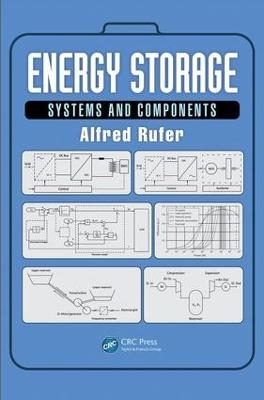
Energy Storage
CRC Press (Verlag)
978-1-138-08262-5 (ISBN)
This book will provide the technical community with an overview of the development of new solutions and products that address key topics, including electric/hybrid vehicles, ultrafast battery charging, smart grids, renewable energy (e.g., solar and wind), peak shaving, and reduction of energy consumption. The needs for storage discussed are within the context of changes between the centralized power generation of today and the distributed utility of tomorrow, including the integration of renewable energy sources.
Throughout the book, methods for quantitative and qualitative comparison of energy storage means are presented through their energy capacity as well as through their power capability for different applications. The definitions and symbols for energy density and power density are given and relate to the volume and weight of a given system or component. A relatively underdeveloped concept that is crucial to this text is known as the theory of Ragone plots. This theory makes possible the evaluation of the real amount of energy that can possibly release out of a given system, with respect to the level of power dependency chosen for the discharge process.
From systems using electrochemical transformations, to classical battery energy storage elements and so-called flow batteries, to fuel cells and hydrogen storage, this book further investigates storage systems based on physical principles (e.g., gravitational potential forces, air compression, and rotational kinetic energy). This text also examines purely electrical systems such as superconductive magnets and capacitors. Another subject of analysis is the presentation of power electronic circuits and architectures that are needed for continuously controllable power flow to and from different storage means. For all systems described, the elementary principles of operation are given as well as the relationships for the quantified storage of energy. Finally, Energy Storage: Systems and Components contains multiple international case studies and a rich set of exercises that serve both students and practicing engineers.
Alfred Rufer (1951) received the M.S. degree from the Swiss Federal Institute of Technology Lausanne (EPFL), Lausanne, Switzerland, in 1976. In 1978 he joined ABB where he was involved in the fields of high power electronics and control. In 1993 he became an Assistant Professor at EPFL. Since 1996, he has been a full professor and head of the industrial Electronics Laboratory EPFL. He has authored or coauthored more than 200 publications on power electronics and applications, and he holds several patents. Alfred Rufer's research activities focus on one hand on power converters as modular multilevel converters in asymmetric or hybrid technologies. Another important field initiated by Alfred Rufer is dedicated to energy storage, where many applications have been studied. Other new developments have recently been presented, for example a low aging, easy to recycle, hybrid energy storage device based on compressed air. In 2006, Alfred Rufer was elected to the IEEE Fellow grade.
1. Generalities on Energy Storage 2. Energy Storage Systems 3. Comparative Ratings and Properties 4. Electrochemical Energy Storage 5. Energy Storage by Means of Supercapacitors 6. Energy Storage Systems Based on Compressed Air 7. Hydropower and Pumped Storage Facilities 8. Flywheel Systems 9. Energy Storage Based on Hydrogen 10. System Arrangements and Applications Appendix A: Power Electronics—Basic Circuits and Principles
| Erscheinungsdatum | 23.11.2017 |
|---|---|
| Zusatzinfo | 41 Illustrations, color; 197 Illustrations, black and white |
| Verlagsort | London |
| Sprache | englisch |
| Maße | 156 x 234 mm |
| Gewicht | 612 g |
| Themenwelt | Naturwissenschaften ► Biologie ► Ökologie / Naturschutz |
| Naturwissenschaften ► Physik / Astronomie | |
| Technik ► Elektrotechnik / Energietechnik | |
| Technik ► Umwelttechnik / Biotechnologie | |
| ISBN-10 | 1-138-08262-7 / 1138082627 |
| ISBN-13 | 978-1-138-08262-5 / 9781138082625 |
| Zustand | Neuware |
| Haben Sie eine Frage zum Produkt? |
aus dem Bereich


